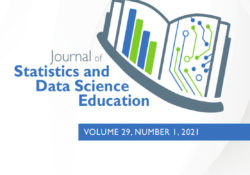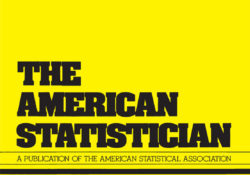tandfonline.com har udgivet en rapport under søgningen “Teacher Education Mathematics”: Abstract Formulae display:?Mathematical formulae have been encoded as MathML and are displayed in this HTML version using MathJax in order to improve their display. Uncheck the box to turn MathJax off. This feature requires Javascript. Click on a formula to zoom. Abstract Although statistical literacy has become a key competence in today’s data-driven society, it is usually not a part of statistics education. To address this issue, we propose an innovative concept for a conference-like seminar on the topic of statistical literacy. This seminar draws attention to the relevance and importance of statistical literacy, and moreover, students are made aware of the process of science communication and are introduced to the peer review process for the assessment of scientific papers.… Continue Reading →
Like this:
Like Loading...
tandfonline.com har udgivet en rapport under søgningen “Teacher Education Mathematics”: Abstract This paper introduces the application and the results of a fuzzy number based questionnaire used for evaluating lecturers’ performance in a newly launched peer review programme in order to enhance the reliability of peer evaluations. In our approach, the membership function of the fuzzy number is composed of an increasing and a decreasing sigmoid membership function conjuncted by Dombi’s intersection operator. Compared to the traditional Likert scale-based evaluation, the proposed fuzzy number based methodology allows peer reviewers to express their uncertainty and the variability of the reviewed lecturer’s performance within a single lecture and during a semester in a quantitative way. By utilising the principles of Dombi’s Pliant Arithmetic, fuzzy Likert scale based evaluations given by peer reviewers can… Continue Reading →
Like this:
Like Loading...
tandfonline.com har udgivet en rapport under søgningen “Teacher Education Mathematics”: ABSTRACT ABSTRACT p-Values and Null Hypothesis Significance Testing (NHST), combined with a large number of institutional factors, jointly define the Generally Accepted Soft Social Science Publishing Process (GASSSPP) that is now dominant in the social sciences and is increasingly used elsewhere. The case against NHST and the GASSSPP has been abundantly articulated over past decades, and yet it continues to spread, supported by a large number of self-reinforcing institutional processes. In this article, the author presents a number of steps that may be taken to counter the spread of this corruption that directly address the institutional forces, both as individuals and through collaborative efforts. While individual efforts are indispensable to this undertaking, the author argues that these alone cannot succeed… Continue Reading →
Like this:
Like Loading...


